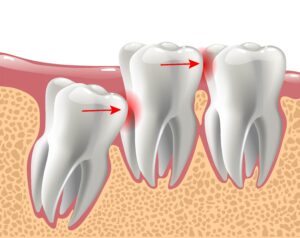At Bright Now, we offer comfortable wisdom tooth extraction for both teenagers and adults. If you or a family member is experiencing symptoms related to painful or impacted wisdom teeth, we can guide you through the extraction process, including sedation options and financing.
Book Appointment





At Bright Now, we prioritize comprehensive oral health care for our patients. By providing affordable wisdom tooth removal, we offer complete smile care in one location. With in-house sedation options available, you can access cost-effective treatment near you, delivered by a team you already know and trust. This eliminates the need for expensive outside referrals to specialty clinics.
Our family dentists and oral surgeons prioritize your comfort throughout the treatment process. From the surgical procedure to recovery, we provide support at every stage. For this reason, we offer in-house dental sedation for all oral surgeries. With sedation, you’ll experience a more relaxed state and may not remember much, if anything, about the actual treatment.
Most patients experience minor soreness for a few days after wisdom teeth removal. We recommend following all medication instructions and taking a few days off work or school. Applying a cold compress to each side of your mouth for up to 20 minutes at a time within the first 24 hours can help with inflammation. You can also rinse with warm salt water to reduce swelling or facilitate food removal. While it’s okay to brush your teeth, avoid brushing around the extraction sites during the first week.
Since most wisdom tooth extractions involve sedation, you will need to bring a friend or family member to drive you home after the appointment.

Extracting these types of teeth helps eliminate the risk of painful cysts, infections, or decay around the third molars. Our goal is to detect issues early so that wisdom tooth removal can be planned before painful symptoms arise.
Even if your wisdom teeth are not causing pain or swelling, they may be more susceptible to infections due to their location and difficulty to clean. Thus, they are prone to tooth decay and periodontal disease, which can spread to adjacent teeth if left untreated. Rather than repeatedly treating problematic wisdom teeth, it is generally more beneficial to have them removed altogether.
Common symptoms of impacted or problematic wisdom teeth include swelling, a foul taste in the mouth, or pain around the back teeth. In some cases, you may observe the wisdom tooth partially erupting through the gums. Our dentists will use digital imaging to locate the teeth, assess their alignment, and determine if extraction is necessary.
In certain cases, large cysts may form around them, posing a threat to the bone and surrounding oral structures. Therefore, regular evaluation of wisdom teeth is essential, even in the absence of symptoms.
When wisdom tooth removal is required, we usually plan a single appointment to extract all four wisdom teeth, with the assistance of dental sedation.
Most people recover relatively quickly, however, there are specific symptoms that need immediate attention. Inform us if you experience any of the following:
• Increasing pain or discomfort over time (which may indicate a dry socket)
• Difficulty breathing or swallowing
• Swelling that does not improve after a few days or worsens
• Persistent bleeding even after applying pressure for 24 hours
By diligently following your home care instructions, you can reduce the risk of complications such as dry sockets or post-surgical infections. We recommend a soft diet for at least 3-4 days and avoiding crunchy or hard foods while your mouth heals. At Bright Now, your comfort is our priority, and we will follow up with you after your oral surgery to address any concerns or questions about your recovery.
The cost varies and depends on numerous factors such as tooth placement, impacted wisdom teeth, and sedation options. During your initial examination, our dental team will provide a detailed treatment plan, including all applicable fees and estimated insurance coverage. Removing wisdom teeth can help save money by preventing potential dental issues, such as infections or decay in neighboring teeth. By preserving the integrity and health of other teeth, additional treatment expenses in the future can be minimized.
Oral surgery procedures, including wisdom tooth extractions, may be covered under medical or dental insurance. At Bright Now, our treatment coordinators work with you to maximize your current insurance plan benefits. We accept most PPO and HMO insurances, making it easier to cover the cost of removing painful or impacted wisdom teeth. To find a Bright Now dentist near you, use our zip code locator tool.
We understand that expenses may arise unexpectedly due to tooth-related pain or infected wisdom teeth. Our affordable care options are designed to accommodate your needs and our low monthly payment plan program allows you to cover your oral surgery and other treatment requirements with ease.
Affordable wisdom tooth removal is available with Bright Now! Dental by your side. During your consultation, we’ll evaluate your wisdom teeth and determine the best course of action. Our family-friendly office is ready to address all your oral surgery inquiries. Contact us today to schedule your next visit or learn more about our affordable financing options.
Book Appointment